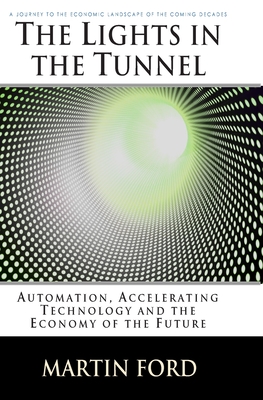 One think-tank book that has been under the radar is The Lights in the Tunnel by Martin Ford. You come across the ideas in smart journals of opinion; I think that will increasingly be true; but in most commercial media, the deep sources of creative thought are usually obscured to give more legitimacy to the middlemen. MF is a deep source.
One think-tank book that has been under the radar is The Lights in the Tunnel by Martin Ford. You come across the ideas in smart journals of opinion; I think that will increasingly be true; but in most commercial media, the deep sources of creative thought are usually obscured to give more legitimacy to the middlemen. MF is a deep source.
Ford’s guiding idea is that technological acceleration is an understated cause of unemployment. The stereotype, which looks to be wrong, is that increases in productivity due to increasing automation will always spin off innovative new jobs eventually. And that those jobs will be better for the unemployed population then the jobs we have now.
We hear a lot about all those green energy jobs to come. But how many people, realistically, are going to be needed to polish up all those solar collectors? And how many people are needed to run Facebook? 12? Okay, more than 12, but there are not 500K plus of jobs in the smartest companies on earth, like Facebook.
I’m being a smart ass, but Ford’s idea is that if the curve of tech innovation is steep enough, then it proves the Luddites right. There won’t be enough work for everybody. The great Steve Jobs was, deservedly, a one-percenter. But even the great SJ didn’t need to personally own 500K of cell phones. So who’s going to buy the iPhones of a mass technological culture if those masses don’t have a job?
Henry Ford saw to it that his workers made enough money to buy the cars that they were producing. But if Ford’s factories are increasingly automated, you eventually reach the point where there are not enough workers employed in the plant, or any other plant, to buy the cars.
That’s the drift of The Lights in the Tunnel. We are those lights, as economically solvent beings, a few of which may burn brighter, like the one-percenters, while the other lights fade out, disrupting the model.
So I wondered if when robots can scan literature better than you can, if you will still want to read. Why would you want to? That’s when I stumbled across The Great Vegetative Library. It’s found in Two Dialogues Concerning Natural Religion by David Hume, one of our 18th century friends.
Imagine that forming a home library was a kind of horticulture. Imagine books without writers. Here’s how it might work: You lay out for yourself a fine selection of bookshelves in a sunny room. You water the shelves appropriately and then leave time for the books to germinate and start to grow on their own! If you had a fine basement library like my good friend JC, then you could grow books like mushrooms, direct from the fungus!
Be sure to lay in some colorful, narrow shelving for the mass markets to pollinate. Mysteries quite naturally prefer dark shelves. If you like science fiction, I think steel shelving allows for more rigorous growth. But if you want massive library sets or an encyclopedia, I recommend built-in shelving to accommodate these larger plants. Please feel free to imagine a vegetative library of your own! What would you want it to contain? There are no writers! What would you like to have in your organic library that is more like a landscape than a reading room?
When I awoke from this fever dream of pod-people literature, I swung in the opposite direction. What if forming an association with the writer was the most important thing in reading? It’s just a thought experiment. I’m imagining that the reason I would want to read Pride and Prejudice is that I want to relate to Jane Austen’s mind. This is a social media kind of attitude and reinforces my impulse to always want to go to the source: To think that the active brain that writes the book is more exciting than the book. It happens to me anyway when I know the writer well. When I read Jonathan Evison, I swear I hear his voice speaking the words. I feel as if he is present and imagining his book before my eyes.
I think that every writer is two persons. The writer creates a second identity for themselves when they create novels. It’s an after-image or shadow identity, the writerly self, that exists behind the book you are reading. It’s that creative self, spinning out a yarn in its own signature style, that I want to get to know. And I want to write back.
That’s my antidote for the robot reader. The robot reader doesn’t need to have a writer. Readers and writers need each other. They need to share the creative force that is the act of writing. Writing is an act. The next time that you read Pride and Prejudice try to imagine that Jane Austen is still writing it.








. . . DH, when you hear my voice, just be glad i’m not singing!
Well JE, considering the origin of storytelling in oral literature,
which I know we both love, traditionally speaking, all novelists are singers…
But you are perfectly right: I still don’t want to hear you sing. Even brotherly love can’t extend that far.